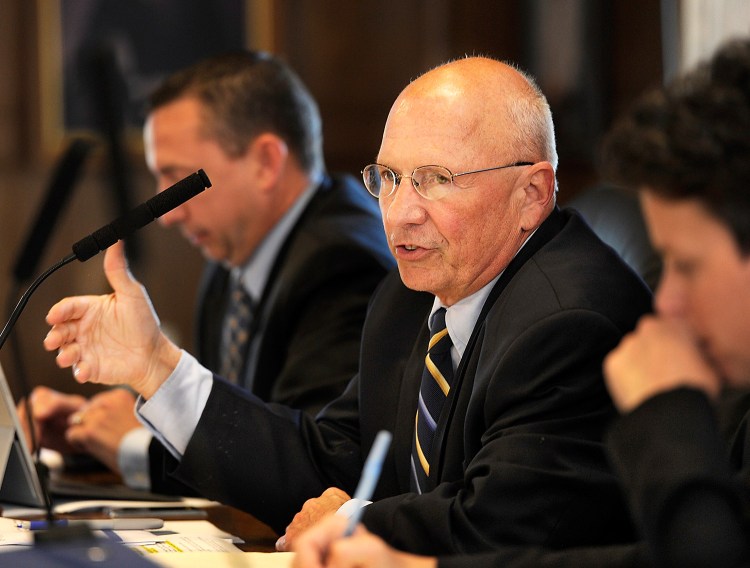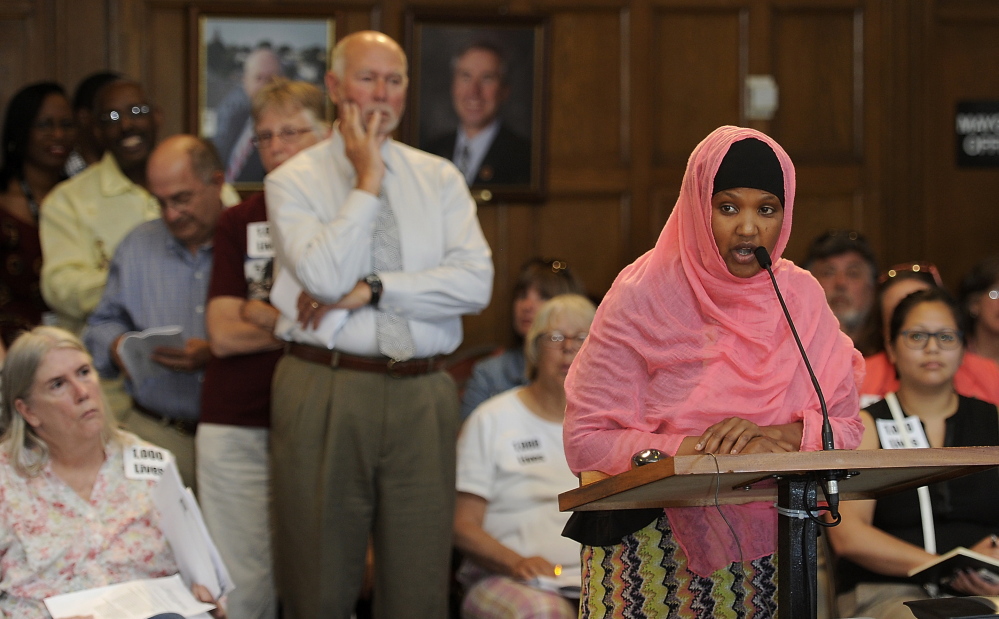The Portland City Council voted 5-4 early Thursday morning to continue providing General Assistance to asylum seekers for at least a year – aid that will cost an estimated $2.6 million.
The council voted in support of an proposal by Councilors David Brenerman and Justin Costa shortly before 1:30 a.m. – after an eight-hour meeting that was filled with passionate testimony and procedural moves by councilors.
Mayor Michael Brennan celebrated the decision.
“We’re talking about 900 people,” Brennan said. “This is not an abstraction This is not a line item veto about what we can afford. These are 900 people who are our friends and our neighbors and our students.”
Councilors Jill Duson, Nicholas Mavodones and Edward Suslovic voted against the proposal, because they supported an alternative that would have extended assistance for six months, rather than a full year. Several councilors were concerned about using state education money to pay for the aid program, while others were concerned about using $500,000 in surplus funds. Councilor Jon Hinck opposed the proposal, because he believed the city would be breaking federal law.
The proposal – along with other budget amendments – is expected to increase property taxes by 3.1 percent, increasing Portland’s tax rate from $20 per $1,000 to $20.62. That’s an estimated $124 increase on a home with an assessed value of $200,000.
The overall city budget, which was adopted 5-4, will not go into effect until July 5, because the budget did not get the support of seven councilors to be enacted as an emergency. Councilors passed a continuing resolution to fund city operations from July 1, when the fiscal year begins, until the budget takes effect.
The council also increased fees for trash bags and voted to keep open the city’s emergency homeless shelter during budget deliberations Wednesday evening.
Councilors voted 5-4 to enact a 35 percent increase, from $10 per 10-bag bundle to $13.50, for the city’s blue trash bags, which will become purple. Residents will have 90 days to use the old bags or trade in unopened bags for new ones, but will have to pay the difference.
The council voted unanimously to keep open the city’s 75-bed overflow emergency shelter and to continue using hotels as overflow shelters for homeless families at a cost of $265,000. The city staff could not explain how the cost had doubled since the budget was first proposed. It’s paid for largely by adding in $300,000 in anticipated revenue from a new $2 million fund that was created by state lawmakers for the more than 40 shelters throughout the state.
The debate on emergency aid followed a three-hour public hearing in which nearly everyone urged the council to continue providing the support for at least 12 months. The city already has spent $5 million for that assistance that was not part of the current budget and will have to be repaid in the coming years.
During the hearing, advocates spoke passionately about the need to continuing providing General Assistance, even though the state pulled its funding. Advocates wore stickers saying “1,000 lives,” brought signs and held battery-powered candles throughout the hearing. One woman handed the city a $134 check to provide assistance.
Advocates, including several current and former asylum seekers, cited the economic and cultural contributions that asylum seekers bring to the city, as many are young and college educated. They said most asylum seekers are women and children, arguing that not providing assistance would cost more in the long run. They also noted that Portland has often led the state on controversial issues, whether it’s equal rights or banning plastic bags.
Tabin Tangilamesu came to Portland seeking asylum. He said he was homeless, spending a night at the city shelter before General Assistance allowed him to get a home. While waiting for a work permit, he said he went to school. Now, he has been granted asylum and is employed at a nonprofit.
“What you have done for me is really, really important,” he said. “For me Portland is home. I feel good, I feel safe, I feel loved.”
Jamie Broder, a shareholder at the law firm Bernstein Shur, which assists asylum seekers, urged the city to use surplus, or “rainy day,” funds to continue providing assistance.
“Amendments to fully fund General Assistance are critical to the heart and soul of this city,” Broder said. “If you don’t think this is a rainy day for them you haven’t put yourself in their shoes.”
The budget also includes a $1 million increase in General Assistance funding from local property taxes, while state funding for the program is expected to drop by $5.6 million to $3.1 million.
Continuing to provide assistance to asylum seekers is estimated to cost at least $4 million over the next year.
The proposed $221.8 million budget eliminates nearly 23 full-time positions, including 14 layoffs. The manager’s proposed budget included a property tax increase of 2.9 percent, or 58 cents, which would increase the property tax rate from $20 per $1,000 assessed value to $20.58.
It also includes $100,000 to develop a sea level rise plan for the Bayside area and uses $500,000 in surplus funds to reduce the impact on property taxes. It also directed federal grants toward mental health, childcare, and housing and food assistance.
Councilors also voted 5-4 to add into the budget a part-time bike-pedestrian coordinator. Most of the $25,000 costs would be paid for by unspent capital projects, adding only $6,200 to the tax base.
Send questions/comments to the editors.





Success. Please wait for the page to reload. If the page does not reload within 5 seconds, please refresh the page.
Enter your email and password to access comments.
Hi, to comment on stories you must . This profile is in addition to your subscription and website login.
Already have a commenting profile? .
Invalid username/password.
Please check your email to confirm and complete your registration.
Only subscribers are eligible to post comments. Please subscribe or login first for digital access. Here’s why.
Use the form below to reset your password. When you've submitted your account email, we will send an email with a reset code.